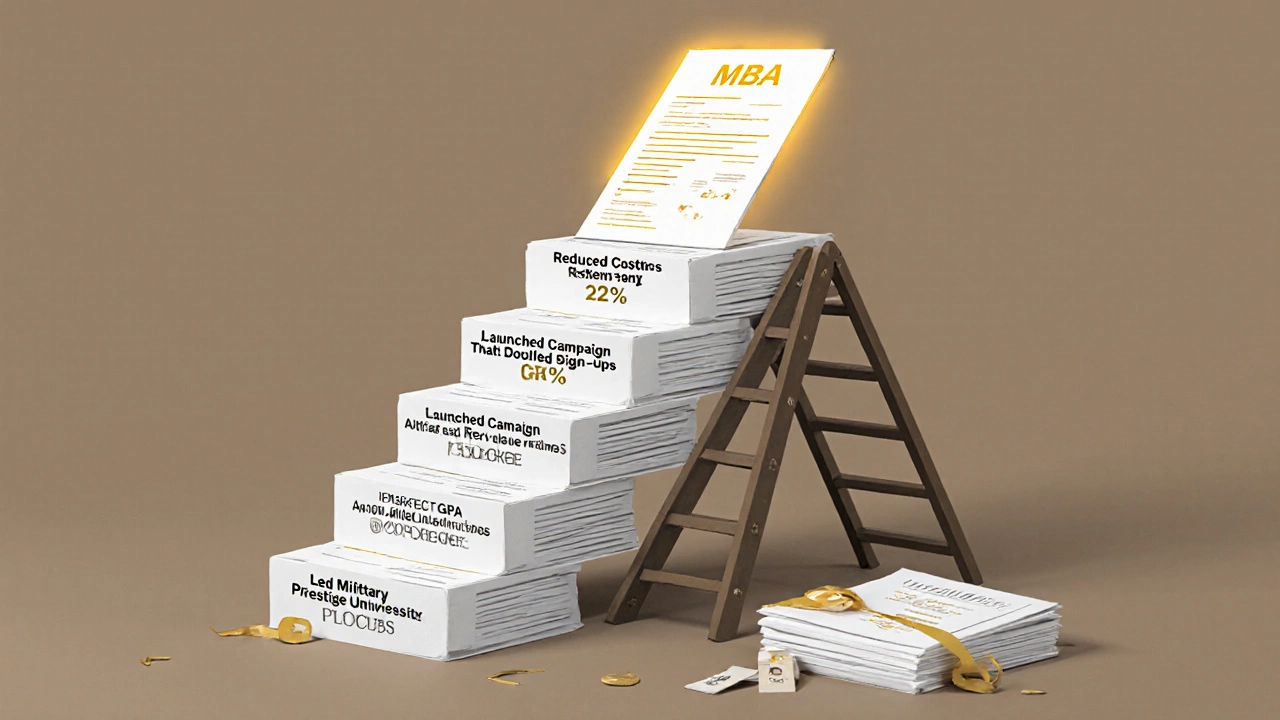
Most people think getting into an MBA program is all about your GPA or test scores. That’s not true. If you scored a 3.2 in undergrad but ran a side business that made $200,000 in profit last year, you’re more likely to get accepted than someone with a 3.9 GPA who never held a real job. MBA programs don’t just want smart students-they want people who’ve already started making an impact.
You Need Real Work Experience, Not Just a Degree
Top MBA programs like Harvard, INSEAD, and London Business School expect applicants to have at least two to five years of full-time work experience. That’s not a suggestion-it’s a baseline. Why? Because MBA classes are built on peer learning. If everyone’s fresh out of college, there’s no one to challenge ideas, share war stories, or bring real-world context to case studies.
What counts as experience? It’s not just job titles. A marketing assistant at a startup who launched a campaign that doubled customer sign-ups has more relevant experience than a corporate manager who just followed流程. Admissions committees look for impact: Did you lead a team? Solve a problem? Save money? Grow revenue? Even if you’re not in management, showing initiative matters.
Some programs accept applicants with less than two years if they’ve had exceptional responsibilities-like running a family business, serving in the military, or managing a nonprofit. But even then, you need to show clear growth and responsibility.
Your GMAT or GRE Score Matters, But Not Like You Think
Yes, you need to take the GMAT or GRE. But a 750 won’t get you in if your resume looks like a college internship list. And a 650 won’t automatically knock you out if you’ve built something real.
Most top schools have average GMAT scores around 710-730. But that’s an average-not a cutoff. Schools use scores to screen for basic quantitative and verbal skills. If your score is below 600, you’ll need to explain why in your application. If it’s above 700, it helps, but it won’t carry you alone.
Many schools now accept GRE scores too, and some even waive standardized tests for applicants with over five years of experience or advanced degrees. Check each program’s policy. Some European schools, like IE Business School, don’t require GMAT at all if you meet other criteria.
Clear Goals Are Non-Negotiable
Why do you want an MBA? If your answer is “to make more money” or “I don’t know what else to do,” you won’t get in. Admissions officers hear that every day. They want to know exactly how an MBA will change your path.
Good answers sound like this:
- “I’ve spent four years in supply chain logistics at a mid-sized manufacturer. I want to move into global operations management, but I lack the strategic framework and network. An MBA will give me the tools to lead cross-border teams.”
- “I run a small organic farm. I want to scale it into a regional food brand, but I don’t know how to raise capital, build a brand, or manage a team. An MBA with a focus on social enterprise is the missing piece.”
It’s not about sounding impressive-it’s about being specific. If you can’t explain your post-MBA role in one sentence, you’re not ready to apply.

Recommendations Must Come From People Who’ve Seen You Grow
Don’t ask your college professor who gave you an A in Econ 101. They haven’t seen you in five years. Don’t ask your best friend who works at the same company. They’re biased.
Choose recommenders who’ve directly managed you, seen you handle pressure, or watched you lead. Your current manager is ideal-if they know you well. If you’re afraid they’ll find out you’re applying, find someone else: a former boss, a client you worked closely with, or a mentor from a volunteer project.
The best recommendations don’t say “John is smart.” They say, “John took over a failing regional project, reduced costs by 22% in six months, and trained three junior staff to handle the workflow. He’s the only person I’ve seen turn a losing situation into a win.” That’s the kind of detail that sticks.
Essays Are Your Chance to Show Who You Are
Your resume lists what you did. Your essays explain why it matters.
One applicant wrote about how she fixed a broken billing system at her job-something no one else had dared to touch. She didn’t just describe the code. She wrote about the fear of speaking up, the resistance from senior staff, and how she convinced them by showing data, not opinions. That’s a story. That’s human.
Another wrote about losing his job during the pandemic and starting a tutoring business from his kitchen. He didn’t mention the MBA until the last paragraph. But the whole essay showed resilience, resourcefulness, and grit-the exact traits schools want.
Don’t write what you think they want to hear. Write what’s true. Be honest. Be vulnerable. Be specific.

International Applicants Need More Than Just a Visa
If you’re applying from outside the U.S., Canada, or the EU, you face extra scrutiny. Schools want diversity, but they also want to know you’ll succeed in their environment.
Strong English skills are a must. If your TOEFL or IELTS score is below 100 or 7.5, you’ll need to show proof of communication ability elsewhere-like leading meetings in English at work, giving presentations, or publishing in English.
Also, explain why you’re choosing this school. Don’t say “It’s ranked high.” Say: “I chose Kellogg because of its focus on collaborative leadership and its alumni network in Southeast Asia, which aligns with my goal to expand my family’s export business into Thailand.”
What Doesn’t Matter (But People Waste Time On)
Here’s what doesn’t qualify you for an MBA:
- Having a prestigious undergrad school
- Knowing someone who graduated from the program
- Volunteering once a year
- Having a perfect GPA from 10 years ago
- Writing flowery essays full of buzzwords like “synergy” or “disruptive innovation”
These might help a little, but they won’t move the needle. Focus on what does: experience, clarity, and authenticity.
Start Now, Even If You’re Not Ready
Most people wait until they feel “ready.” They think they need more experience, a higher score, or better recommendations. But the truth? You’ll never feel fully ready.
Start by mapping your career path. Write down where you are now and where you want to be in five years. Then ask: What’s missing? Is it leadership skills? Financial knowledge? A network? That’s your MBA gap.
Talk to alumni. Attend virtual info sessions. Read student blogs. Find people who’ve done what you want to do. Their stories will show you what’s possible-and what’s expected.
You don’t need to be perfect. You just need to be real, focused, and ready to grow.




